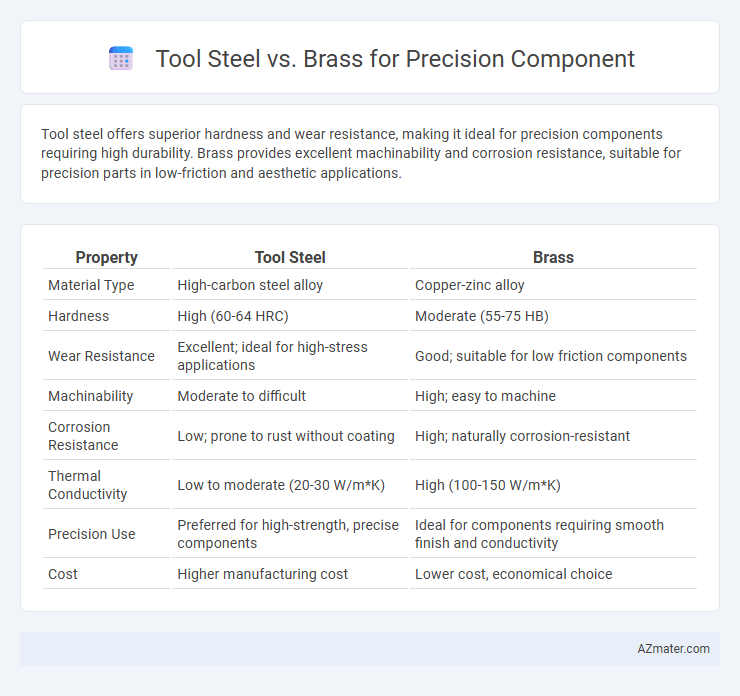Tool steel offers superior hardness and wear resistance, making it ideal for precision components requiring high durability. Brass provides excellent machinability and corrosion resistance, suitable for precision parts in low-friction and aesthetic applications.
Table of Comparison
| Property | Tool Steel | Brass |
|---|---|---|
| Material Type | High-carbon steel alloy | Copper-zinc alloy |
| Hardness | High (60-64 HRC) | Moderate (55-75 HB) |
| Wear Resistance | Excellent; ideal for high-stress applications | Good; suitable for low friction components |
| Machinability | Moderate to difficult | High; easy to machine |
| Corrosion Resistance | Low; prone to rust without coating | High; naturally corrosion-resistant |
| Thermal Conductivity | Low to moderate (20-30 W/m*K) | High (100-150 W/m*K) |
| Precision Use | Preferred for high-strength, precise components | Ideal for components requiring smooth finish and conductivity |
| Cost | Higher manufacturing cost | Lower cost, economical choice |
Introduction: Tool Steel vs Brass for Precision Components
Tool steel offers exceptional hardness, wear resistance, and dimensional stability, making it ideal for high-precision components subjected to heavy mechanical stress. Brass exhibits excellent machinability, corrosion resistance, and electrical conductivity, often preferred for components requiring intricate detailing and good thermal properties. Comparing tool steel and brass for precision components involves balancing durability needs against ease of manufacturing and environmental factors.
Material Properties Overview
Tool steel offers exceptional hardness, wear resistance, and high tensile strength, making it ideal for precision components subjected to high stress and abrasive conditions. Brass provides excellent corrosion resistance, good machinability, and moderate strength, suitable for components requiring electrical conductivity and aesthetic appeal. The selection between tool steel and brass depends on the specific performance criteria such as mechanical durability versus corrosion resistance and conductivity.
Machinability Comparison
Tool steel exhibits lower machinability compared to brass due to its higher hardness and strength, resulting in increased tool wear and slower cutting speeds. Brass offers superior machinability with excellent chip formation, reduced tool wear, and higher cutting speeds, making it ideal for intricate precision components. The choice between tool steel and brass hinges on balancing machinability with required mechanical properties and component durability.
Wear Resistance and Durability
Tool steel exhibits superior wear resistance and durability compared to brass, making it ideal for precision components subjected to high stress and friction. Its hard microstructure retains sharp edges and resists deformation under repeated use, while brass, although corrosion-resistant and easier to machine, tends to wear faster and deform under heavy loads. Choosing tool steel enhances the longevity and performance of precision parts in demanding industrial applications.
Corrosion Resistance
Tool steel offers superior hardness and wear resistance but is prone to corrosion without proper surface treatment or coatings, limiting its longevity in humid or corrosive environments. Brass, composed primarily of copper and zinc, inherently provides excellent corrosion resistance due to its natural patina formation, making it ideal for precision components exposed to moisture or chemicals. For applications requiring long-term durability in corrosive conditions, brass outperforms untreated tool steel in maintaining structural integrity and performance.
Thermal and Electrical Conductivity
Tool steel offers low thermal and electrical conductivity, making it ideal for applications requiring heat resistance and electrical insulation in precision components. Brass exhibits high thermal and electrical conductivity, enabling efficient heat dissipation and electrical transmission in components where these properties are critical. Selecting between tool steel and brass depends on the specific thermal management and electrical performance needs of the precision component.
Cost Efficiency and Availability
Tool steel offers superior durability and wear resistance for precision components, often leading to lower long-term costs despite a higher initial price. Brass provides excellent machinability and corrosion resistance, making it cost-effective for less demanding applications where quick fabrication and availability are critical. Availability of tool steel may be limited in specialized grades, whereas brass is widely stocked, contributing to faster lead times and reduced procurement costs.
Application Suitability in Precision Engineering
Tool steel exhibits exceptional hardness, wear resistance, and dimensional stability, making it ideal for components requiring high precision and durability in cutting tools, dies, and molds. Brass offers excellent machinability, corrosion resistance, and good strength, suitable for precision parts in electrical connectors, fittings, and instrumentation where conductivity and ease of fabrication are critical. The choice between tool steel and brass depends on specific application demands like mechanical stress, environmental conditions, and required tolerance levels in precision engineering.
Maintenance and Longevity Considerations
Tool steel offers superior wear resistance and high hardness, significantly reducing maintenance frequency and extending the lifespan of precision components in demanding environments. Brass, while easier to machine and resistant to corrosion, generally requires more frequent maintenance due to its lower hardness and susceptibility to deformation under stress. The choice between tool steel and brass impacts long-term performance, where tool steel's durability supports longevity and consistent precision in high-wear applications.
Conclusion: Choosing the Right Material for Precision Components
Tool steel offers superior hardness, wear resistance, and dimensional stability, making it ideal for high-precision components subjected to heavy loads and abrasive conditions. Brass provides excellent machinability, corrosion resistance, and electrical conductivity, which suits precision parts used in low-stress, decorative, or electrical applications. Selecting the right material depends on balancing mechanical performance requirements with environmental factors and cost constraints to ensure optimal precision and durability.

Infographic: Tool steel vs Brass for Precision component
 azmater.com
azmater.com